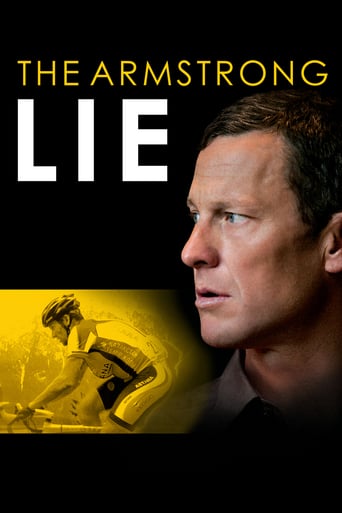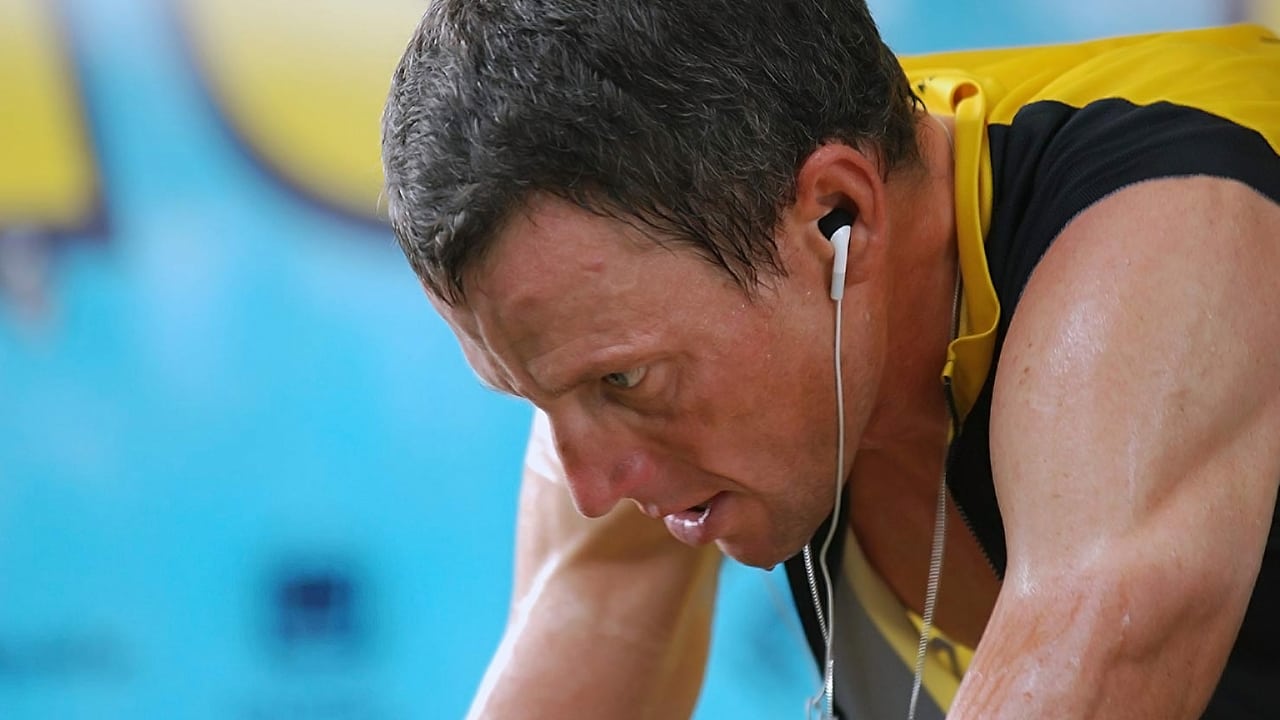Leofwine_draca
Alex Gibney is a prolific and well-respected documentary film-maker; I've previously seen his piece on paedophile priests, MEA CULPA, which made for harrowing viewing. THE ARMSTRONG LIE is his version of the Lance Armstrong story with an engaging hook: Gibney started filming long before the doping scandal hit, so he's able to chart the rise and fall of a hero every step of the way.This is a quietly gripping documentary that never outstays its welcome despite a lengthy running time. Despite the fact I have zero interest in cycling (in fact, I hate cyclists with a passion), I was thoroughly engrossed in the psychology behind the tale, as well as the 'devil may care' attitude of the participants.Armstrong himself comes across as a complex beast, a man who it's easy to both like and hate at the same time, as weird as that sounds. But it's Gibney who comes out of this the strongest, having made a documentary that resolutely refuses to take sides, instead presenting a full version of the story and allowing viewers to make up their own minds. It's a winner.
priyantha-bandara
The Armstrong Lie is a documentary that takes a deep look at one of the most horrendous best kept lies of the sports history, the rise and fall of Lance Armstrong after being disgracefully accused for doping. He was once known as the greatest cyclist the world has ever seeing who won 7 Tour De France titles from 1999-2005 after battling and recovering from cancer.After winning 7 titles and being away for 4 years in retirement Armstrong makes a surprise come back in 2009 with hopes of winning another title and raising funds for cancer patients. The director of this documentary Alex Gibney was hired to make a documentary of the comeback of Armstrong and he has being covering Armstrong's sports history for quite some time. But as the doping scandal came to light the original project was never finished. But in 2013 Gibney decided that he needs a proper ending to his documentary and re-opened it after Armstrong makes a confession on Oprah Winfrey show.This documentary is quite easy and interesting to follow. For someone with even a mild knowledge about professional cycling and Armstrong it can be digested without much effort. While having a deep look at Armstrong's sporting career and the doping dilemma the documentary effectively provides important background information about the sport itself that fuels the main plot. And it manages to tell the story from several perspectives than being biased in to one point of view, the intention being the viewer to have their own conclusion of what had really happened. There ample amount of historical footage of practice runs, races, press conferences, court trials and other video that builds a strong case relating to each other. Obviously for being someone like Armstrong most of his well-known part of his entire life is on film somewhere. The challenge which the director goes through is to filter the most relevant and create a flow that doesn't over hype or dull to the viewer. In my opinion the job was well done.The Armstrong Lie is a powerful piece of documentary film making. And it would give you new perspective of what really went on with Lance Armstrong. Maybe you have followed his case eagerly while it was hot but now since things have gone a bit cold a relook would be ideal. Just as Armstrong phrase many times it felt OK at the time.
dallasryan
First and foremost, I don't condone anything Lance Armstrong did. That being said, from a summarized look, we all live lives that are constructed for us. Some are mothers, others are painters, others are this or that. So with someone in high stakes sports at the most difficult and professional level, it's tough to judge anyone unless one's walked a day in their shoes/in their life.It can be understood that Armstrong had everything at stake, everything to lose on this lie, therefore it can be understood why he kept it going. And if any one of us were put in that situation where the stakes were just as high, who knows what we would do. It's easy to judge, but it's not easy to live a life where the stakes are so extreme.With that said, I never caught on to the whole Armstrong Phenomena, but if I was to learn one of my heroes such as Joel O'Steen was a liar, I would be crushed. So I dislike what Armstrong did extremely not for the lie itself or for what he felt he had to do, but for how the lie connected with so many people and how it hurt so many people. For that and that alone I dislike Armstrong very much.Because even though he did have cancer, he used it in connection with his one big lie to inspire hope, love, money, friendships, and infinite possibilities that anything can be beaten or achieved. His foundations raised so much money for a good cause, that it helped many children and adults fight their battles.The money his organization raised did so much good. We should be thankful that the organization saved a lot of lives with the money it raised. But the Armstrong lie shattered a lot of lives with people losing their inspiration and hope, and hating Armstrong. It also wasn't right how Armstrong defamed a lot of people to keep the lie going.It's really about the children though, where Armstrong is in the scenes with the kids with cancer, and with their parents. I can just imagine if those kids were still alive and how those parents must have felt that this man, Lance Armstrong, had the audacity to lead these parents and children on with this lie. Because the hope wasn't so much the cancer, it was that he was beating the odds with it with his cycling. And the cycling was the lie, and everything else was connected to that lie and went down the drain with that lie.Lance Armstrong understood what was at stake and he understood what would happen if he was caught and I respect at least the fact that he was completely honest with his truth about it finally, showing no remorse because showing any emotion would have been in vain anyway. However, it shows what a cold and in some way heartless human being Armstrong is in not breaking down and feeling bad for what he did. It's human to feel bad for living a lie. It's human to feel stress that what you're doing if you are caught hurt yourself and a lot people.But it seems Armstrong showed no remorse at all. He was living the incarnate of a slippery slope, of walking the line, the tightrope, in the end everything went down with his lie because it was all connected to it, from the cancer, to the hope he inspired, to the money, to the everything, that one lie became the lie to everything.At least Armstrong understood the fact that it's fair that he's getting what he deserves now. Maybe he's not ultimately an awful person, but he got caught in a lie that made him an awful person. I almost wish he would have never gotten caught for the good that his Cancer Organization did. Such a shame all around. Truly is. Shame on Lance for how he hurt and destroyed so many people.
sammy-balamy
To judge something in terms of how it's executed is all well and good but in a documentary such as this the message takes precedence. It seeks the truth and all the arguments aren't displayed for that to emerge. If it it simply allowed the viewer to make up his own mind then that would be o.k but the film displays a bias thereby becoming a vehicle and a misleading one at that.The fact that doping was prevalent in cycling and still plays a large factor is obvious. If Armstrong was racing on a level playing field of dopers then that to me would also have been acceptable. However this was far from the case.Non of Lance's team mates were caught doping whilst they were in his team. Meanwhile all his major competitors were absent from the start line at various points in time due to suspensions and had some key teammates missing from every tour for the same reason. Throughout all the disruptions, devastation, controversy and even a suicide Armstrong was always there with a full strength squad.The film touches on the importance of team mates and how on all of his wins Armstrong rode alone for only minutes at a time, but fails to take the next step and look at how the various disqualifications imposed on all other teams (apart from his own during his winning years) affected his competitors. Had the film done this Armstrong would never have agreed to be in it because he's still pushing the lie that he won those seven Tours fair and square once we accept as fact that they were all doping.The UCI had invested in him and were being invested in by a lot of the same sponsors, they allowed many cyclists to burn whilst protecting this man. The film doesn't touch on those aspects and the film maker remains a fan.I gave the film five stars because it is well shot and well put together. I am a cycling fan and it's view of the race was a pleasure to watch. There is stock footage obviously but the film does follow Armstrong and films the 2009 race independently. The film gives an insight into what it takes to be a professional rider and rider's relationships with one another and their team officials.Some of the people interviewed I've never seen interviewed i.e doctor Ferrari, which added another point of interest for me.The 2009 and other pre-'outed' interviews were interesting, giving an insight into Armstrong's mentality at the time and although there is marked contrast to his post-confessional ones it's by no means a transformation and a true repentance. His approach to people seems outwardly very different now, but his attitude towards his legacy and the morality of his actions remain to all intents and purposes unchanged. The exclusions of Paul Kimmage and Greg Lemond from the documentary also indicate this.I'd say watch the film but bear the other stuff in mind too.



 AD
AD




